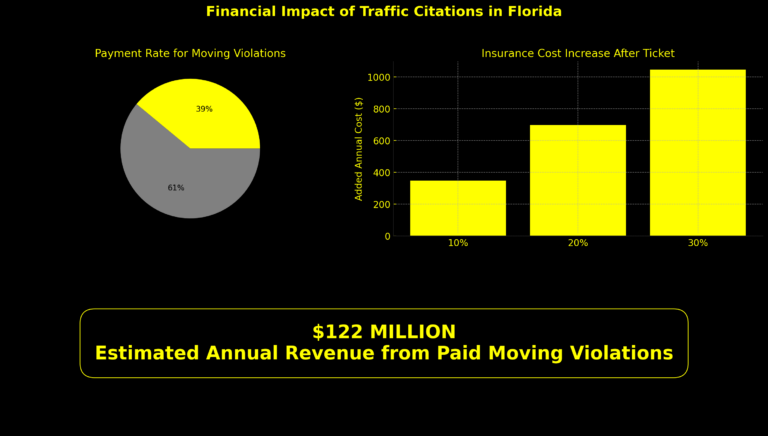Florida’s driver’s license points system may seem just like another part of the bureaucracy of driving, but it holds real power over your driving privileges, your insurance rates, and, sometimes, your job. Understanding how Florida’s points system works and what kinds of infractions add points to your record can help you make more informed decisions. In Florida, a single speeding ticket or running a red light isn’t just a ticket — it’s potentially a mark on your record that could cost you big time in the long run.
How Does Florida’s Points System Work?
The points system in Florida assigns a specific number of points to various traffic infractions, from speeding to reckless driving. Accumulating points within a certain timeframe can lead to consequences that go beyond fines, including license suspensions. Here’s a breakdown of some of the most common offenses and how many points they can add to your license:
- Speeding (less than 15 mph over the limit): 3 points
- Speeding (15 mph or more over the limit): 4 points
- Reckless driving: 4 points
- Passing a stopped school bus: 4 points
- Leaving the scene of a minor accident: 6 points
For every point, the penalties become harsher as you approach thresholds for license suspension. If you accumulate 12 points within 12 months, your license can be suspended for 30 days. Accumulating 18 points within 18 months results in a three-month suspension, and 24 points within 36 months brings a one-year suspension. For the entire list of points and infractions click here.
What Happens to Insurance Rates?
Insurance companies keep a close eye on your driving record, so accumulating points almost always leads to increased premiums. While each company uses its own formula for rate adjustments, drivers with points on their record typically pay between 20% to 50% more than drivers with clean records. This spike can last for years, even if you’ve only had a single infraction. According to one source the increase can be upwards of 15% for a single ticket. For many, one or two minor incidents might add up to thousands of dollars in insurance costs over a few years.
Additionally, the more severe the infraction, the bigger the impact. A few points for a minor speeding ticket could bump up your rate by $100 or so, but a serious infraction — like reckless driving or leaving the scene of an accident — might push your premium up by hundreds of dollars every six months. So, while a ticket might seem like a one-time issue, it can end up costing you well beyond that initial fine.
Comparing Florida to States Like North Carolina
While Florida’s point system is strict, other states take it even further. North Carolina, for example, is notorious for its rigorous points system and the steep insurance rate increases that accompany violations. In North Carolina, a driver caught speeding 15 mph over the limit in a 55-mph zone gets a whopping four points on their license and could face up to 80% increases in their insurance premiums. That’s in stark contrast to Florida, where the points system is somewhat more lenient with certain speeding violations, but it still isn’t exactly forgiving.
North Carolina also places more emphasis on reducing driving infractions in general. After a certain number of points, North Carolina drivers must complete defensive driving courses or lose their license for extended periods. In comparison, Florida offers options like “driving school” to offset points for certain infractions, making it easier to avoid long-term damage to your driving record. However, the flexibility of Florida’s system also means drivers sometimes underestimate the risks until they’re facing a suspension.
What About Out Of State Tickets?
Florida handles out-of-state traffic tickets in a way that can still impact your driving record, thanks to the Driver License Compact (DLC). Florida is a member of this agreement, which is an arrangement between states to share traffic violation information. So if you, as a Florida driver, receive a ticket in another state, that violation doesn’t stay hidden; it often makes its way back to Florida. Depending on the severity of the offense, points could be added to your Florida license just as if you had committed the infraction within state lines.
When an out-of-state violation is reported to Florida, the state evaluates the nature of the infraction. Florida does not apply points for every type of ticket received elsewhere — for example, parking violations or non-moving violations generally won’t affect your Florida record. But for significant moving violations, like speeding, reckless driving, or DUIs, points will usually be added according to Florida’s point system guidelines, regardless of where the incident happened. This means a speeding ticket issued in, say, Georgia or New York for 15 mph over the limit can translate into four points on your Florida license. More serious violations that would result in an automatic suspension within Florida can also lead to a suspension, even if they occurred out of state.
In some cases, drivers are surprised to see points added to their record long after the incident, especially if there’s a delay in communication between states. Because of these complications, Florida drivers who get ticketed out of state often benefit from consulting a traffic attorney to potentially contest the ticket or reduce the charges before it’s sent back to Florida. Otherwise, they risk accumulating points that could affect their insurance rates, lead to a license suspension, or make it difficult to clear up their record later on.
Why Consult a Traffic Lawyer?
With stakes this high, consulting a traffic lawyer after receiving a ticket or citation can often be the wisest choice. A traffic attorney can help challenge the infraction itself, negotiate reduced charges, or even get the case dismissed, depending on the circumstances. Keeping points off your record means protecting yourself from insurance rate hikes, potential suspensions, and other penalties down the road.
For many, the upfront cost of hiring an attorney is easily outweighed by the potential savings on insurance premiums and the avoidance of additional fines. A lawyer can also clarify the complex language of traffic law, helping you understand the potential consequences and all available options. And in many cases, simply having an attorney advocating on your behalf can increase the likelihood of a favorable outcome.
All told, Florida’s point system may seem simple, but it’s anything but lenient when it comes to the consequences. By understanding how it works and why each point matters, Florida drivers can take smart steps to protect their record and their budget — starting with that call to a traffic lawyer.



